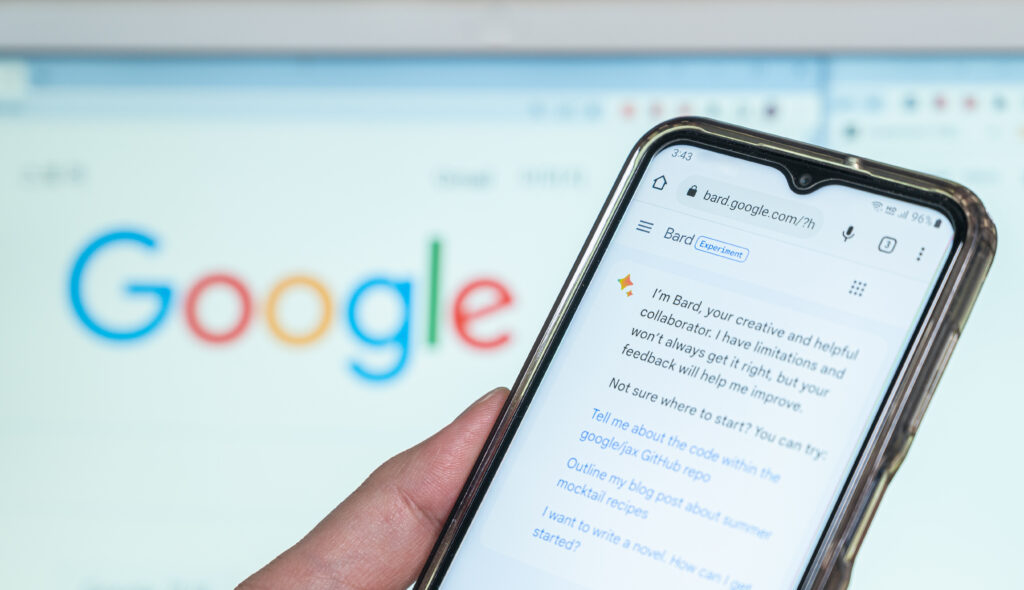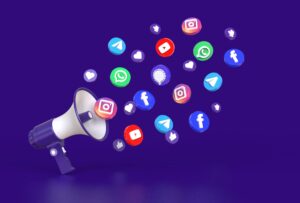Over the past few years, artificial intelligence (AI) has transitioned from a theoretical concept for many Americans to a practical tool that people can try. For example, 58% of Americans have at least heard about ChatGPT — an AI tool that generates text and conversations. ChatGPT has become so popular amongst the younger generations that several school districts have developed policies to prevent cheating through the use of AI.
In the near future, AI has the potential to become a key aspect of your digital marketing process. This tool can streamline your customer service, generate ad copy, and even create video content to engage customers. However, before you heavily invest in AI, stop to check in with your customers. Evaluate what people think about AI in their content, customer care, and sales. Here are some trends you should know about so you can use this tool mindfully.

Most People Already Use AI — They Just Don’t Know It
Before diving into the practicalities of implementing AI within your marketing efforts, it helps to have a clear picture of what your customers think about it. According to Pega’s survey of 6,000 adults by Pega, 72% of Americans say they understand what artificial intelligence is. However, few people actually realize how often they engage with AI and machine learning tools throughout the day. For example, only 34% of respondents said they had ever interacted with AI, but when asked about their online behavior, Pega found that 84% of respondents had used AI tools.
Not everyone recognizes the AI systems that allow users to use email spam filters, predictive text on their phones, or curated news feeds. These apps and programs are all powered by AI and react based on consumer preferences and behavior.
This data is actually good news for many digital marketing professionals. If consumers are already comfortable using AI systems — even if they don’t know it — then marketing teams can continue to invest in AI without isolating or confusing customers. This data highlights how the best AI tools are often unnoticeable to humans. Not everyone has to feel like they are talking to a robot to engage with an AI program.
Chatbot Adoption Remains Low Amongst Customers
The first thing to review when considering using AI in your business is the implementation of chatbots within your customer service team. This is often touted as a way to reduce your customer service center burden while streamlining solutions — even if a chatbot can’t solve a problem, it can collect enough information for a human to resolve the issue quickly.
However, not all customers are eager to have their problems solved by AI. One survey by Garner found only eight percent of customers used a chatbot in their last customer service experience. Of those who did, only 25% said they would want to use a chatbot again.
The issue, the team at Gartner highlights, is that chatbots can solve some customer problems but not others. While chatbots could resolve 58% of return or cancellation requests, they could only handle 17% of billing disputes. Customers also couldn’t get information on a product or service (19% success rate) or change their products or services (17% success rate) through the chatbot.
This doesn’t mean that your company should avoid AI for customer care. Instead, this data serves as a cautionary tale to learn what your chatbots can do when you allow them to help customers. You can figure out what issues your AI bots can handle and which need to be immediately forwarded to in-person representatives.
More Brands Are Exploring in AI-Generative Content
One of the biggest uses for AI in today’s digital marketing world is the use of robots to generate content. Historically, copywriting has been a time-consuming and expensive part of the marketing process. However, it is also an essential process. You need to create ads, blog posts, and social media updates for users to engage with to connect with your brand. If an AI tool can create 30 social media posts in an hour or write a dozen blog articles, the potential to scale your content creation efforts is almost limitless.
One of the most common trends with AI is the idea that just because you can do something doesn’t mean you should — and copy generation is one of the best examples of this. The first thing to consider is whether or not consumers can tell when a robot writes something. CNN created an interesting article where you can see the quality of content generated by ChatGPT. In some cases, it might be nearly impossible to determine the difference between human-made and AI-generated copy. This is good news for marketing teams.
However, there is also bad news, and that comes in the form of the Google algorithm. In an August 2022 statement, John Mueller, Google’s Search Advocate, said AI-developed content goes against its guidelines. Auto-generated content could result in a search penalty, which means your hard-earned SEO rankings could tumble unexpectedly.
There is a happy medium for brands that want to use AI tools to create content but don’t want SEO penalties. You can use apps like ChatGPT to create content and then review it with your human copywriting team to make the text more natural, more in-depth, and simply better overall. In this case, the AI content becomes the jumping-off point to create a rough draft that human writers then improve.
Google is Embracing AI in PPC Tools
While Google’s SEO team continues to warn against the dangers of using AI-developed content and threatens to penalize companies that auto-generate copy, Google’s paid ads department is fully embracing AI tools for ad creation. This is the challenge of a single search engine having nearly 84% market share compared to other brands like Bing (9%) and Yahoo (2.7%). You have to play by Google’s rules if you plan to drive traffic to your pages from its site.
The Search Generative Experience (SGE) was announced at Google I/O 2023. These tools are just beginning to roll out and will become more common and easier to use throughout the year. They consider the intent of the user when generating ads for them. This frees up time for digital marketers to continue optimizing their ads instead of having to write them.
There are multiple AI tools that Google has created to support its ads platform. Businesses can take a more hands-off approach when running their ad content as long as they trust that Google will make the best decisions for their needs. However, it can be hard to believe that a company that wants to take your money will only operate altruistically to manage it to maximize your ROI. Even with these new AI tools, you might want to work with a paid search agency that can optimize and manage your ad copy to drive results that fall within your budget and ROI goals.

AI Can Streamline Social Media Efforts
Artificial intelligence is a big-picture concept for how software systems work. The reality is that you will likely invest in several different AI tools that move your digital marketing efforts into the modern era. From your email segmentation efforts to your analytics tools, you will use AI to stretch your budget and create better customer experiences.
The team at Hootsuite created a guide for how AI can improve your social media department. One of the most useful tools is image creation, where AI generates royalty-free pictures that you can use across your social pages and blog posts. This is a great option if you want to create highly specific images and can’t find what you need on stock photo sites. This is also a potential way to streamline your graphic design efforts.
AI can also optimize your social media efforts by adding captions to your videos, which are essential for both accessibility and usability, ideating ideas for new posts, and even writing the social media posts themselves. If you share a blog post or newly-created video, you can save time with an engaging social media post generated by an AI tool.
This doesn’t mean that your social media team will be outsourced by robots. On the contrary, it will free up time for your social media department to focus more on strategy development and optimization. Your team can explore new trends and test out ideas to see what audiences think of them, which is something overly-taxed teams might not have had the bandwidth before the help of AI.
Consumers Want Transparency About the Use of AI
There’s one more thing to consider as you develop plans to implement generative AI into your digital marketing efforts: Customers want to know when they are engaging with digital tools. While an earlier survey mentioned that most people don’t realize they already use AI, another investigation by Dentsu Inc. found that 78% of consumers believe brands should disclose when a service is offered by AI. Similarly, 75% of consumers believe a brand should disclose when they generate content by AI.
Keep this in mind if you use AI to generate blog content, ad copy, and other digital marketing materials for your brand. While these tools can certainly help you scale your content creation efforts and reduce the workload for your team, your customers want to know when they are reading AI-generated writing. You might consider adding a small note at the beginning or end of your content that highlights the use of AI to develop the content initially — even if a human edited and improved it before it was published.
Embrace AI through J&L Marketing
Every business is different, so you can’t immediately say whether brands should embrace or reject AI tools. The reality is that AI systems might be able to support companies in certain ways but not others. What works for one brand might not be a good fit for a different one — even if they are in the same industry.
Evaluate the opportunities you currently have to use AI and their potential benefits and risks to your business. If you aren’t sure how to move forward, contact our team. At J&L Marketing, we strive to help our clients outsmart, not outspend the competition. If an AI tool can help you scale your marketing efforts or drive better results, we can work



